Israel: Conflict With Regime Not Iranians
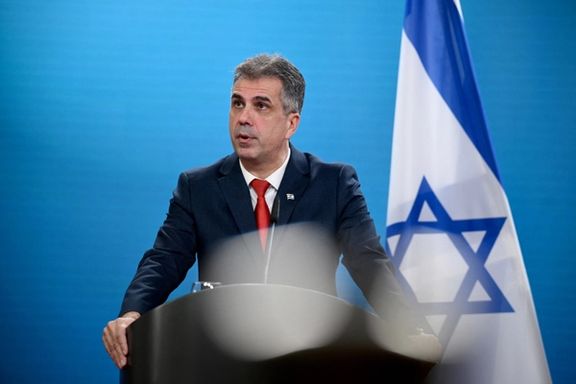
The Israeli Foreign Ministry, addressing the people of Iran via its Farsi page on X, emphasized that its conflict is with the Islamic Republic, not the Iranian people.

The Israeli Foreign Ministry, addressing the people of Iran via its Farsi page on X, emphasized that its conflict is with the Islamic Republic, not the Iranian people.
The same message was also echoed in English on the ministry's official page.
In response to Iranian claims of causing significant damage, the ministry also posted a video of a fighter jet landing safely at Nevatim Airbase, dispelling the allegations as operations at the base continued unimpaired.

Iranian regime’s direct retaliation against Israel from Iran’s soil establishes beyond any doubt that the ruling clerics are reeking in desperation in the face of Israel’s humiliating April 1 strike.
Israel, escalating its attacks against Iranian targets in Syria, raised the bar and hit a building in Iran’s embassy compound in Damascus, killing seven IRGC officers, who were key in Tehran’s proxy operations. For 13 days, Khamenei was facing a Hobson’s choice.
Khamenei’s regime has been suffering from an unprecedented crisis of legitimacy and credibility in recent years and it seeks to reassure its “armed supporters” within and without the Iranian borders of its enduring rigor and robustness. The retaliation seems to have been a desperate face-saving attempt by Khamenei against all odds.
From the outset the operation was doomed to fail as the low-tech Iranian drones and cruise missiles had to traverse a 1000-mile distance between the two countries. It was inevitable that the behemoth of the Israeli, American, and British regional and satellite surveillance capabilities would detect and track down this cavalcade of slow-moving projectiles en route to the Israeli air space. Thus, the bulk of the Iranian swarm, except for a handful few, amply became an easy prey for American, British, Israeli, and Jordanian air defenses that managed to intercept and shoot them down with agility and precision. Based on early estimates by the Israeli Defense Forces, few of the said projectiles did reach the Israeli air space and even fewer managed to effectuate an impact on any target on Israeli soil. The Iranian regime’s propaganda machine has already staged out jingoistic carnivals on major Iranian city streets that seek to replay the militant Islamic youths’ parades of the Iran-Iraq War (1980-1988) years.
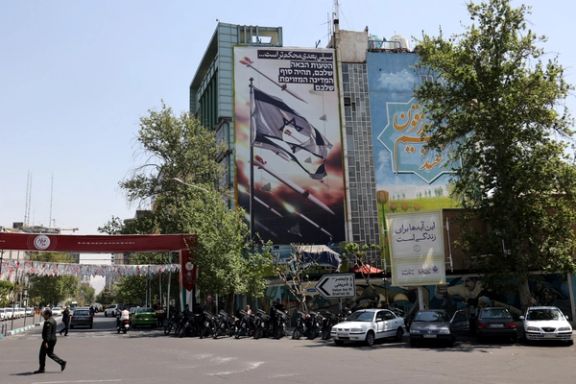
In fact, the gap between the Iranian regime and people at large has been widening at levels reminiscent of the last couple of years of the Iran-Iraq War when the Iranian masses could no longer bear chronic shortages in basic goods, food, high fuel costs, and commodities. The poverty index in the country has reached heights never seen before in contemporary Iranian history and the regime’s lack of legitimacy has even reached the traditional working classes that supplied the bulwark of the volunteer fighters during the Iran-Iraq War. Khamenei’s regime has even lost that critical support base in the recent years.
Since 2018 when US President Donald J Trump pulled out of the nuclear deal with Iran (JCPOA), the Iranian economy has been in a ruinous downward spiral. The ruling clergy and their praetorian IRGC have been struggling to preserve their regime from economic collapse at the hands of runaway inflation, rampant government rentier corruption, a twenty-year drought, widening international sanctions, and dwindling oil revenues. Over the past 6 years the regime has had to face off mass nationwide protests that have called for the regime’s ouster. From November 2019 nationwide brutal crackdown to the unprecedented suppression of the 2022 Woman, Life, Freedom uprising, the regime’s security forces have committed countless crimes against humanity toward civilians. The magnitude of this brutal suppression has led to a fact finding mission mandated by the UN Human Rights Council.
A regime that once professed to be the patron of all “oppressed peoples” is now only in power through its security and military industrial complex. Since 7 October 2023 Hamas attacks on Israel, Iran’s Shia Imperium has unleashed the arsenal of suicide drones, rockets, and missiles (ballistic and cruise) of its armed proxies from Iraq, Lebanon, Syria and Yemen upon Israel, the US bases, as well as the maritime navigation in the Red Sea.
For years, the Islamic regime engaged Israel via its armed proxies, primarily and chiefly, the Hezbollah of Lebanon, Hamas, and the Islamic Jihad of Palestine. The humiliation of having two his top generals killed by Israel on April 1 was, however, a tremendous blow to Khamenei’s brand as a truly anti-Israeli leader amongst Iran’s friends and foes alike. He could no longer hide behind its proxies and had to confront Israel directly.
Irrespective of the miserable failure of the Iranian retaliation against Israel, the Israeli war cabinet has effectively called Khamenei’s bluff by vowing to respond to the Iranian retaliation. As Iran and Israel have no common borders, the war of attrition with Israel will inevitably be an all-out asymmetrical war through proxies. The question is whether Russia and China would continue to economically bail out the Iranian regime. Only time and the continuing strategic value of Iran in the West-East rivalries can answer such a question with certainty.
In the end, Khamenei’s direct attack against Israel from the Iranian soil represents a radical “doctrinal shift” that can only preserve his legitimacy amongst the regime’s regional proxies. In the 1980s, many Iranians perceived the war against Iraq as just. Except for the regime’s ever thinning armed supporters, any war of attrition, direct or asymmetrical, will further burden the collapsing Iranian economy. In this context, most Iranians are economically impoverished and politically discontented with the regime. Moreover, great many of them do not perceive any conflict with Israel as just. Khamenei may soon realize that his gamble to save face will backfire, within and without the Iranian borders.
The opinions expressed by the author are not necessarily the views of Iran International.
Follow developments on Iran International's Live coverage of ongoing tensions between Iran and Israel.
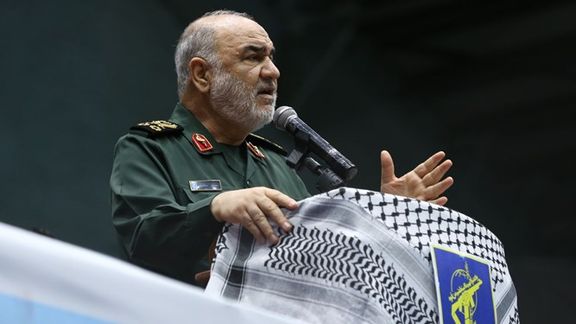
Iran's top military commanders have labeled Sunday night's aerial bombardment on Israel a “success" in spite of the fact that 99 percent of the 350 or more projectiles failed to reach Israeli territory.
The Iranian Armed Forces Chief of Staff, Major General Mohammad Bagheri, said that the operation, launched as a retaliatory attack following Israel's alleged airstrike on the Iranian consulate in Damascus this month, was finished, the goals achieved.
Bagheri also revealed that Tehran has issued a warning to the United States via the Swiss embassy.
“If the US joins the Zionists' next aggression through its bases or military bases in the region and this becomes certain, then America's regional bases, personnel, and facilities will not be secure in the region,” Bagheri warned.
In the face of the humiliating failure of Iran's first ever direct hit on Israel, Hossein Salami, the Iranian Revolutionary Guard chief commander, also alleged that the attack had been a success “beyond expectations.”
Interceptions were carried out across the region before ballistic missiles, suicide drones and cruise missiles reached Israeli territory, a joint effort between Israel and its allies the US, UK, France and Jordan. A seven-year-old Bedouin girl has been injured by shrapnel in southern Israel however, from a direct hit which caused minimal damage to Nevatim Air Base which was fully operational within hours. No other casualties are known.
Iran’s attack came after top level calls for retaliation for the Damascus consulate attack which killed one of Iran's most high-ranking members of the Islamic Revolutionary Guard, along with several other officers.

Iran launched more than 350 drones, ballistic and cruise missiles towards Israel Saturday/Sunday night local time, marking the first such attack in the history of the Islamic Republic.
Although the massive strike launched mostly from inside Iranian territory caused little damage, the risk of an Israeli response escalating into a full-blown war looms large.
The attack was anticipated given Iran's vow to retaliate against Israel's targeting of Iran’s consulate in Damascus on April 1. Intelligence assessments had predicted an imminent and significant strike.
The initial wave of the attack struck Israel around 2 am local time, resulting in explosions in the sky as Israeli defense systems intercepted drones and missiles. Some missiles managed to evade interception, hitting an airbase in southern Israel and causing minor damage, according to Israeli army spokesperson Daniel Hagari.
Of 170 UAVs 0 entered into Israeli territory / Of 30 Iranian cruise missiles, 0 entered Israeli air space, 25 downed by Israel. Most of 120 ballistic missiles were intercepted by the arrow defense system, causing minor damage to infrastructure at Nevatim Air Force base by direct hit but still operational.
Iran’s state-affiliated media celebrated the operation as a huge success, and the foreign ministry called it “an inherent right of self-defense as recognized under Article 51 of the UN Charter, against Israel's recurring military aggressions.”
However, the attack drew condemnation from UN Secretary-General and several governments, including those of Canada, Germany, France, UK, and the US. President Biden lauded Israel's defense capability, reaffirming the US commitment to its security.
“Israel demonstrated a remarkable capacity to defend against and defeat even unprecedented attacks – sending a clear message to its foes that they cannot effectively threaten the security of Israel,” US President Joe Biden said shortly after the operation was over. He stated once more that his government’s commitment to Israel was “ironclad”.
It’s unclear how Israel would respond to the attack. Unnamed Israeli sources told Iran International that it certainly will. The Israeli War Cabinet did convene during the attacks and authorized Benjamin Netanyahu and two of his ministers to decide on the response –which, according to Israel’s Channel 14, would target “Iranian territory.”
What is also not clear is the timing of the Israeli response. Netanyahu would most likely discuss his options with Biden, who fears the tit-for-tat to lead to an all-out regional war and bog down the US military in yet another conflict in the Middle East less than six months before the 2024 US elections.
The Biden administration seems to want to downplay the significance of Iran’s attack in a bid to restrain Netanyahu.
CNN quoted a senior administration official who said President Biden has told Netanyahu that “Israel should consider tonight a win” because Iran’s attacks had been “largely unsuccessful” and nothing of “value” was hit. CNN also reported that Biden had made it clear to Netanyahu that the United States “will not participate in any offensive operation against Iran.”
Biden’s stance is bound to anger his more hawkish critics, who accuse him of abandoning Israel and even appeasing Iran. He will feel the heat in Washington, and in the Capitol, in particular, in the days to come, as ardent supporters of Israel push for a tougher stance on Iran.
“This is the moment for the US to show we stand together with our allies,” Senator Roger Wicker (R-MS), Ranking Member of the Armed Service Committee posted on X. “Our shared enemies, including Iran & their proxies, need to know our commitment is unwavering. We must join with Israel to ensure that Iran’s aggression is met with resolute action & resounding strength.”
Senator Marsha Blackburn (R-TN) was another lawmaker who called for US involvement in a military operation against Iran.
“Iran has begun launching drone strikes on Israel,” she posted on X shortly after news broke of Iranian drones heading for Israel. “We must move quickly and launch aggressive retaliatory strikes on Iran.”
Former President Donald Trump was also quick to weigh in on the subject, albeit from a more personal angle.
“Israel is under attack! This should never have been allowed to happen,” he posted on his digital platform Truth Social. “This would never have happened if I was President,” he said, in a comparatively subtle sneer at Biden –who, in all likelihood, will face him in the battle for the White House this November.
Follow developments on Iran International's Live coverage of ongoing tensions between Iran and Israel.
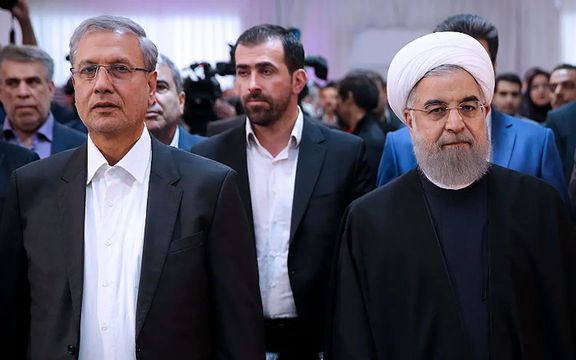
Former Iranian minister and long-time intelligence official Ali Rabiei has criticized the government’s domestic policies and Iran's inherent weaknesses amid Tehran’s increasing tensions with Israel.
In an article published in Etemad daily on Friday, Ali Rabiei listed multiple crises and problems the Iranian government is currently facing. He emphasized that without addressing these issues, it would be unwise for Tehran to engage in a potential direct conflict with Israel, which would only exacerbate the situation.
Rabiei stressed the need for wise governance and effective crisis management. "We must first mitigate the impacts of existing crises to prevent the collapse of the system," he emphasized.
He pointed to economic crises including inflation hovering around 50%, declining social cohesion, and the prevailing psychological instability within society as some of the pressing crises confronting the country and its political leadership. Given these circumstances, Rabiei advocated for the adoption of "conciliatory policies" to reduce tensions and foster unity and empathy within society.
Multiple nationwide anti-regime protests have shaken the clerical-military rulers of the Islamic Republic since 2018. Security forces have killed thousands of protesters and jailed tens of thousands of others to quell the largest unrests in November 2019 and in 2022-23. In the parliamentary elections on March 1, a sizeable majority of voters stayed home, further damaging the legitimacy of the ruling apparatus.
Although Rabiei did not explicitly mention the government’s compulsory hijab policy in his article, his statements could be interpreted as implicit criticism of the controversial hijab enforcement campaign initiated by law enforcement agencies, which came into effect on Saturday.
Earlier in the day, Iranian media reported the arrest of the wife and daughter of Ahmadreza Abedzadeh, a prominent figure in Iranian football history, in Tehran for refusing to comply with hijab regulations. Many women have forsaken the hijab, a phenomenon deeply unsettling for the ruling clerics, who see women’s defiance as a direct challenge to their ideological hold over the society.
The regime's repressive domestic policies and mounting pressures, particularly on women, have fueled widespread dissatisfaction and delegitimized the government. Similarly, Tehran's foreign policy towards Israel, and its controversial nuclear program, have isolated the country and badly damaged its oil-dependent economy.
In recent days, Iranian officials have escalated their anti-Israel rhetoric and vowed revenge for Israel’s April 1 strike that killed seven IRGC forces in Damascus. On Saturday, IRGC naval forces seized a Portuguese-flagged cargo ship near the Strait of Hormuz, alleging it belonged to an Israeli billionaire.
However, the Iranian market does not seem to view the IRGC’s actions as a success, as evidenced by the record fall in the value of the national currency, the rial. On Saturday, the US dollar rose to the unprecedented level of 660,000 rials in Iran’s free market.
Meanwhile, the relatively independent news website Khabaronline reported a significant increase in criticism against President Ebrahim Raisi, with many of his supporters calling for a cabinet reshuffle to address the demands of the people. According to the website, economic fluctuations have severely impacted the prices of essential goods and people's livelihoods, necessitating urgent action to reverse the trend.
Eqtesad 24 news website reported in February that nearly one in every three Iranians currently lives below the poverty line due to soaring inflation over the past five years.
Follow developments on Iran International's Live coverage of ongoing tensions between Iran and Israel.
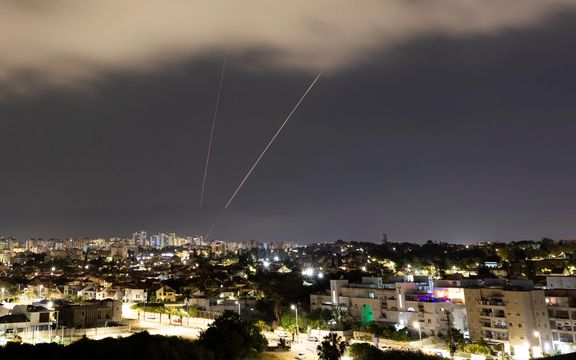
Two Israeli officials told Iran International that "Iran's attacks on Israel tonight will not go unanswered," as Israeli, US, UK and Jordanian air forces downed dozens of incoming Iranian drones.
However, the Israeli officials did not specify the nature of the response or its timing.
Israel's military said it was sounding sirens in locations throughout the country early on Sunday, as Iran International’s live broadcast from Israel showed multiple interceptions of incoming projectiles.
Although it was not clear if drones or missiles were being destroyed by multiple Israeli air defense systems, our correspondent believed some anti-missile defenses were also operating at around 2:00 am local time.
Israel's Magen David Adom ambulance service said early on Sunday that it had received no word of any casualties from Iranian drones launched at the country, many of which local media described as having been intercepted.
Jordanian jets downed dozens of Iranian drones flying across northern and central Jordan heading to Israel, two regional security sources told Reuters.
The sources said the drones were brought down in the air on the Jordanian side of the Jordan Valley and were heading in the direction of Jerusalem. Others were intercepted close to the Iraqi-Syrian border. They gave no further details.
Israel plans a "significant response" to the unprecedented Iranian drone salvo against it, top-rated Channel 12 TV quoted an unnamed senior Israeli official as saying early on Sunday.
An Israeli defense official told Army Radio that more than 100 Iranian drones have already been intercepted outside of Israeli airspace, out of hundreds fired at Israel.
The report said the drones were downed by the United States and the United Kingdom. Earlier, the IDF said it had identified more than 100 drones heading toward Israel.
Follow developments on Iran International's Live coverage of ongoing tensions between Iran and Israel.
Additionally, a video surfaced from the Iranian parliament where members were seen celebrating the attack on Israel and chanting "Death to Israel!" The Israeli foreign ministry responded stating, "One thing is clear: We are strong, resilient, and we will never give in to terror. Those who harm the people of Israel will pay the price."
The escalation followed an April 1 attack on the Iranian embassy in Damascus, which Iran attributes to Israel, resulting in the deaths of two IRGC generals among others.
Iran's permanent mission to the UN wrote on X that the aerial bombardment was "Conducted on the strength of Article 51 of the UN Charter pertaining to legitimate defense, Iran’s military action was in response to the Zionist regime’s aggression against our diplomatic premises in Damascus."
In a warning to the US which had supported Israel's defensive efforts on Sunday morning along with the UK, France and Jordan, the post said that while the operation was complete, it warned: "The matter can be deemed concluded. However, should the Israeli regime make another mistake, Iran’s response will be considerably more severe. It is a conflict between Iran and the rogue Israeli regime, from which the US MUST STAY AWAY!






